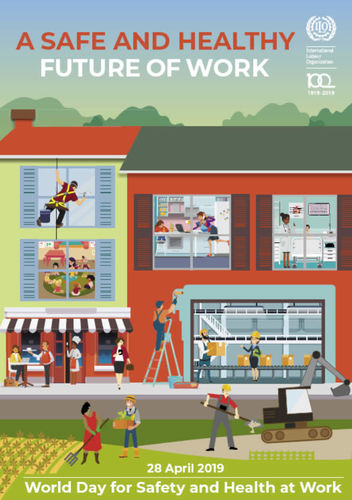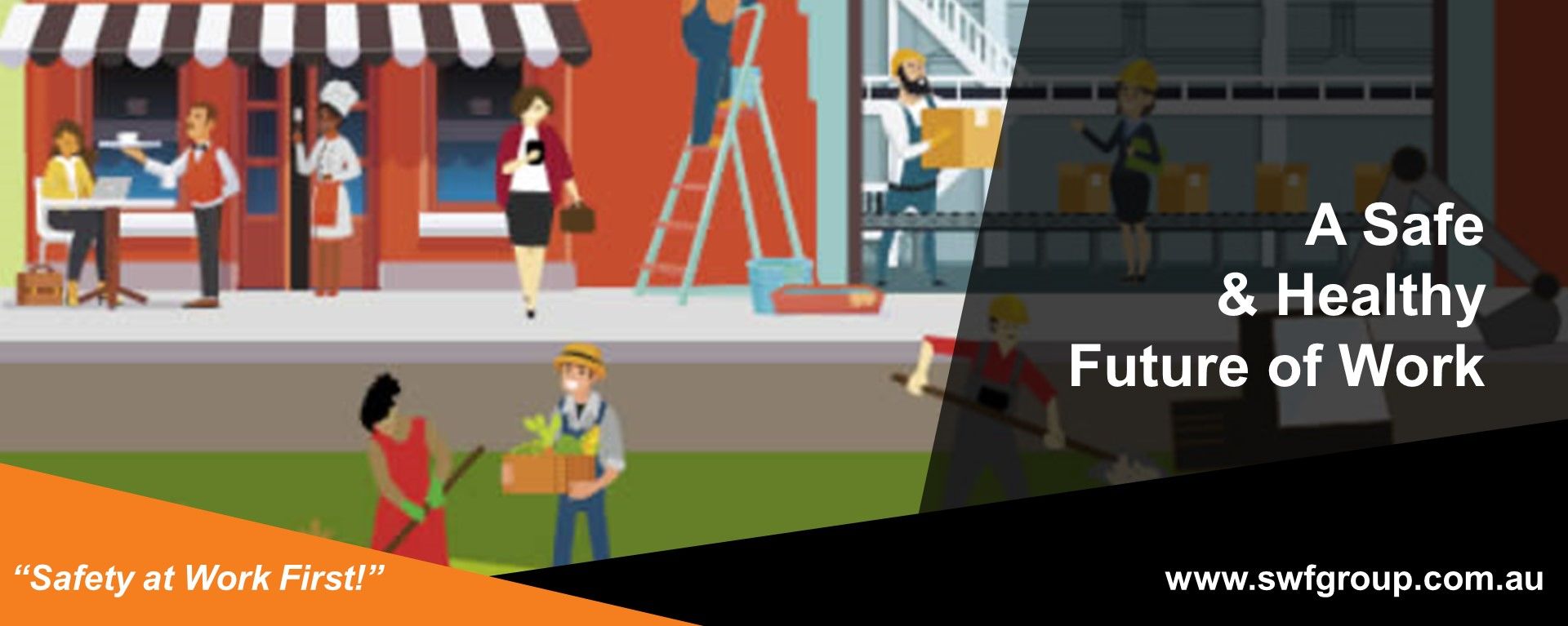
A Safe & Healthy Future of Work
Every year 2.78 million workers die from occupational accidents and work-related diseases (of which 2.4 million are disease-related) and an additional 374 million workers suffer from non-fatal occupational accidents globally.
Aside from the economic cost, there is an intangible cost, not fully recognized in these figures, of the immeasurable human suffering caused by poor occupational safety and health (OSH) conditions. This is tragic and regrettable because, as research and practice over the past century has repeatedly demonstrated, this suffering is largely preventable.
Psychosocial risks, work-related stress and non-communicable diseases are of growing concern for many workers in all parts of the world. At the same time, many workers remain challenged by persistent work-related safety and health risks and it is important not to overlook these populations as the world of work continues to transform.
Sunday 28 April is World Day for Safety and Health at Work (World Day) and Workers’ Memorial Day. World Day promotes safety and health in the workplace and Worker’s Memorial Day honours those who have died from work-related injury or illness. A Global Commission on the Future of Work report, released in January 2019, forms the basis for the 2019 World Safety Day theme, “Safety and Health and the future of work”.
The “Work for a brighter future” report, published by the International Labour Organisation, outlines the forces transforming the workplace and opportunities that exist to ensure this change is for the better. Governments and employers’ and workers’ organisations are encouraged to take committed action to “reinvigorating the social contract” that exchanges workers’ contributions to the economy with their rights, protection and economic provision.

A three-pronged “human-centred” approach is recommended, including increasing investment in:
- people’s capabilities;
- the institutions of work; and
- decent and sustainable work.
People’s capabilities:
- In increasing investment in people’s capabilities, a universal entitlement to lifelong learning is key to taking advantage of new workplace technologies and developments, as well as for ensuring workers have the capabilities to participate fully in a democratic society. This includes building an effective and financially viable lifelong learning system.
- Supporting workers through work transitions is critical for ensuring they can cope with changes, particularly as global transformations make these changes more challenging and numerous. Particular support should be given to young workersmaking the school to work transition and older workers seeking to extend their working life.
- To address continued gender inequality, the report recommends adopting policies that promote shared domestic and care work between men and women, creating accountability measures for gender equality progress, strengthening women’s representation and leadership, and considering the impact of new workplace technologies on gender equality.
- Strong social protection systems that provide a basic level of protection from birth to death, as well as contributory insurance schemes that provide increasing levels of protection, are necessary. This requires ensuring that rights and benefits are portable for workers across different workplaces, industries, countries and employment categories.
The institutions of work:
- To increase investment in the institutions of work, the report identifies a need for the provision of adequate protection of all workers, regardless of their employment type or contract. This includes laws that grant access to fundamental workers’ rights, an adequate living wage, maximum working hours, and workplace health and safety standards.
- As new technology and excessive working hours increasingly blur the line between work and personal life, workers need increased choice and control over their working hours, while still meeting the needs of enterprises. The report suggests this will lead to improved health, wellbeing and performance for individuals and enterprises.
- Governments must ensure all workers and employers have freedom of association and the right to collective bargaining. These collective organisations must also seek to represent diverse interests and increase their legitimacy through innovative ways of organising labour action and connecting with workers.
- As technological transformations take place, a human-centred approach to work design, such as job crafting discussions between workers and management, should be prioritised. When working with artificial intelligence, the report recommends all final decisions be affecting work be made by humans. Care must also be taken in the effective application of labour laws and in the protection of data in the digital workplace landscape.
Decent and sustainable work:
- To increase investment in decent and sustainable work, the report made a strong recommendation for countries to invest in economic areas of strategic importance in meeting global needs. This could include the care economy, action that mitigates climate change and development of rural economies. Regardless of the area chosen, direct investment in high quality physical, digital and social infrastructure is a necessity.
- Reshaping business success to prioritise the human-centred agenda for future work outlined in the report is critical for its implementation. This includes revising fiscal policies, accounting standards, stakeholder representation and reporting practices. Country progress measures must also take into account other dimensions of growth, including the value of unpaid work and the effect of economic activity.
Let's re-commit to a Safe & Healthy Future of Work on Sunday, 28th April!
At SWF Group our mission is "To help you achieve safety at work first, through the dependable supply of quality, cost effective and hassle-free workplace safety solutions, specific to your workplace."
We stock a comprehensive and innovative range of Workwear, Footwear, PPE, First Aid, Corporate Clothing, Site Safety, Protective Clothing, Safety Signs and Materials Handling Equipment.
SWF Group | "Safety at Work First!"
#SafetyAtWorkFirst #WorkSafeHomeSafe #worldWHSday2019 #FutureOfWork #HealthAndSafety #ilo


 Australian Owned & Operated
Australian Owned & Operated





